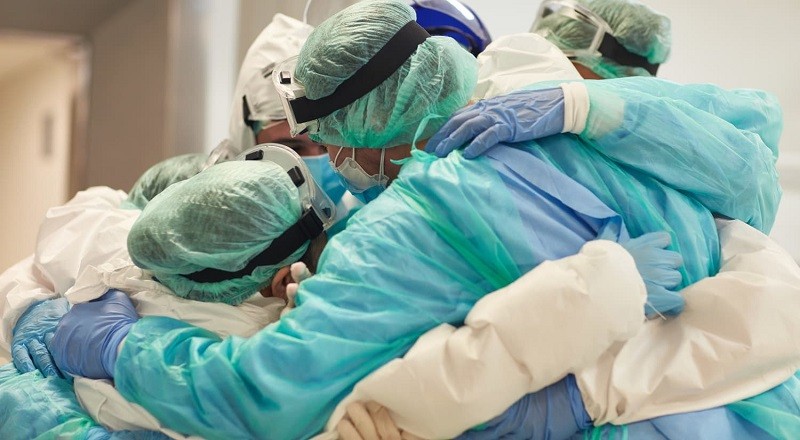The Union Ministry of Health has revised the guidelines for the treatment of ‘Mild’, ‘Moderate’ and ‘Severe Covid-19’ patients. The guidelines have been issued by AIIMS, ICMR – Covid-19 National Task Force, and Joint Monitoring Group (DGHS) under Union Health Ministry for management of adult Covid-19 patients.
Guidelines for the management of adult Covid-19 treatment having MILD symptoms: The upper respiratory tract symptoms or fever without shortness of breath comes under the ‘mild’ Covid-19 symptoms.
MUST Dos: Home isolation, physical distancing, indoor mask use, and monitoring temperature and oxygen saturation.
SEEK HELP: if faces difficulty in breathing or the SpO2 goes below 93%. High-grade fever/severe cough, particularly lasting for more than five days
MAY DO: Inhalational Budesonide (given via Metered dos inhaler/ dry powder inhaler) at a dose of 800 mcg BD for 5 days) to be given if symptoms (fever or cough) are persistent beyond five days of disease onset.
Guidelines for the management of adult Covid-19 patients having MODERATE symptoms:
Respiratory rate is less than or equal to 24/minute and breathlessness. SpO2 between 90% to 93%—These are the moderate Covid-19 symptoms.
MAY Dos: Awake proning is encouraged in all patients requiring supplemental oxygen therapy. Methylprednisolone 0.5 to 1 mg/kg in two divided doses (or an equivalent dose of dexamethasone) usually for a duration of 5 to 10 days. There is no evidence for benefits for injectable steroids in those NOT requiring oxygen supplementation, or on continuation after discharge.
Anti-inflammatory or immunomodulatory therapy (such as steroids) can have a risk of secondary infection such as invasive mucormycosis when used too early, at a higher dose, or for longer than required. Conventional dose prophylactic unfractionated heparin or low molecular weight heparin (weight based e.g. enoxaparin 0.5mg/kg per days SC). There should be no contraindication or high risk of bleeding.
Guidelines for the management of adult Covid-19 patients having SEVERE symptoms:
Patients having a respiratory rate of less than 30/minutes, breathlessness, and oxygen level less than 90% on room air are considered to have severe Covid symptoms.
Anti-inflammatory or immunomodulatory therapy:
Inj Methylprednisolone 1 to 2 mg/kg IV in two divided doses (or an equivalent dose of dexamethasone) usually for a duration of 5 to 10 days.
Steroids can have a risk of secondary infection such as black fungus when used too early, at a higher dose, or for longer than the required period.
Clinical monitoring: Work of breathing, hemodynamic instability, change in oxygen requirement
Serial CXR; HRCT chest to be done only if there is worsening
Lab monitoring: CRP, D-dimer, blood sugar 48 to 72 hourly; CBC, KFT, LFT 24 to 48 hourly.
Remdesivir may be considered only in patients with:
– 10 days of onset of symptoms, in those having moderate to severe diseases (requiring supplemental oxygen), but who are not in IMV or ECMO
-Consider remdesivir for five days to treat hospitalised patients with Covid-19 (No evidence of benefit for treatment more than five days)
-Not to be used in patients who are not on oxygen support or in the home setting
-Recommended dose: 200 mg IV on day 1 followed by 100 mg IV OD for the next four days.
Tocilizumab may be considered only:
-Rapidly progressing Covid-19 needing oxygen supplementation or IMV and not responding adequately to steroids (preferably within 24-48 hours of the onset of severe disease/ICU admission).
Also Read: Dhanush and Rajinikanth daughter decide to separate after 18 year
-Preferably to be given with steroids
-No active tuberculosis, fungal, systemic bacterial infection
-Long term follow up for secondary infections (such as reactivation of TB, flaring of Herpes, etc)
-Recommended single dose: 4 to 6 mg/kg ( 400 mg in 60 kg adult) in 100 ml NS over one hour
The latest guidelines have not recommended medicines like ivermectin, favipiravir, and Doxycycline. Antivirals like Molnupiravir and monoclonal antibodies are also not included in the guidelines.


Comments are closed.